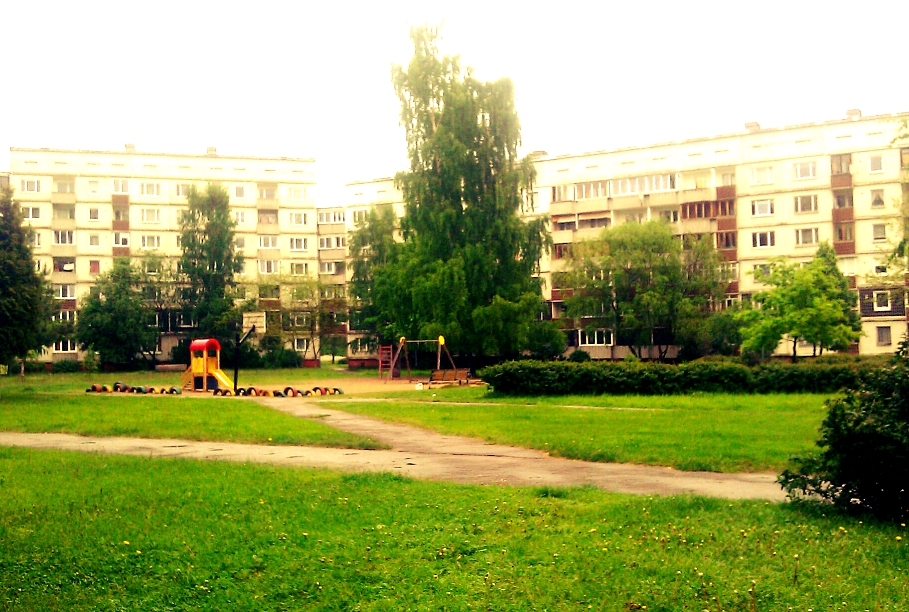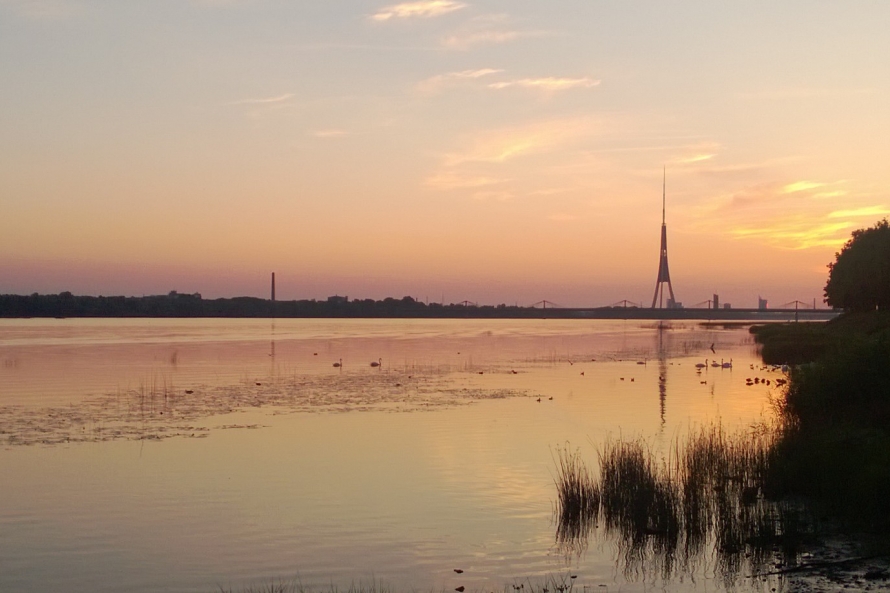Just before sundown, I took a walk through my neighborhood, called Ķengarags. I didn’t see much until I got to the river, the goal of my small pilgrimage. That is, to say, I didn’t see anything you wouldn’t see in other working-class neighborhoods of the capital. Nothing that really warrants too much attention on a grumpy, freezing day.
To get to the River Daugava from my apartment, you have to walk through an alley fenced off on both sides, situated between a construction site, which doubles as a parking lot, and a kindergarten. Onwards it’s mostly similar blocks of apartment buildings with yards that function as playgrounds. As elsewhere, you’ll often see people in their mid-40s drinking alcohol by the sandboxes and playground slides.

A playground between apartment buildings in Zolitūde. It is a typical sight in many neighborhoods of Rīga, mine included.
November 21, 2015 marked the second anniversary of the Zolitūde disaster. What happened two years ago in Zolitūde, as much as the neighborhood superficially resembles others with its rows of cookie-cutter apartment buildings and ‘types’ you see doing the same things just in different places, caused very harmful and particular consequences for a row of very particular individuals.
Yesterday some of the people affected by the supermarket crash told their stories - a very brave thing, I think - on Latvian Television. Among them was Mārtiņš, a former Maxima employee. He is a gentle-spoken young man with a near-constant disarming smile, one that surely won him many smiles back in Maxima where he worked as a clerk prior to the disaster. Mārtiņš has spent the last two years rehabilitating.
As he was being interviewed, that same smile gained an edge when he talked about the nightmares he’s having from the nine hours spent squeezed under a layer of concrete before he was rescued. The pain seeping from that smile, for me, dissolved the apartment houses, the ‘types’, the all-too-familiar playgrounds and everything else associated with any neighborhood in Rīga, even one struck by disaster. What was left was the real, in-the-flesh, and admittedly somewhat worn-out individual.
Interviews with and stories about people in distress can reveal flickers of the intense human suffering behind statistics. However, despite the apparent self-evidence of this simple fact, such stories still somehow surprise us.
For example, the first comment in a Latvian-language viewpoint piece by Kārlis Streips, concerning the three-year-old Iraqi boy who drowned a few months ago, screams ‘media manipulation!’ in ferocious tones, despite the fact that Streips’ piece clearly wasn’t a news story.
Such comments are mostly posted on entries that concern ‘others’. Refugees are a good example of the ‘other’. Adverse reaction - often receiving many 'likes' - to these entries range from the usual ‘media manipulation’ banter to claims that the coverage has been paid for by the Society Integration Foundation, a government institution that funds projects like conferences and tolerance-promoting videos for understanding between different groups of society.
I suppose a chief reason behind these cries is that stories about suffering make us feel bad. But pain is found in reliving the memories as well. People who prefer to reject human stories could be doing so because once the thought that ‘this human being is suffering’ hits home, the guilty thought that follows is ‘and here am I, in the warmth of my home’.
This article isn’t intended to contribute to the refugee debate, or for that matter to the moral conundrum of caring differently about local versus distant tragedies. It’s just that the paranoia surrounding such pieces is damaging. It is fashionable nowadays to claim that everything from advertisements to speeches to the plots in fiction writing is manipulative, but in a twisted turn of events many have taken the same attitude against facts reported in good faith by the media.
What I’m pleading for is not necessarily ‘More human interest stories!’ (but yes, that too). Rather, I merely wanted to remind myself that while nobody has to like everyone or anyone, sharing a singular, particular perspective, painful as it may be, remains a prerequisite to glimpsing an alternate universe where the they might have been us.
The river was great, when I eventually got there, as it always is. It’s not called Likteņupe – the river of fate - for nothing. And now I see once again that it’s made up of countless tiny drops, like many other things.
































